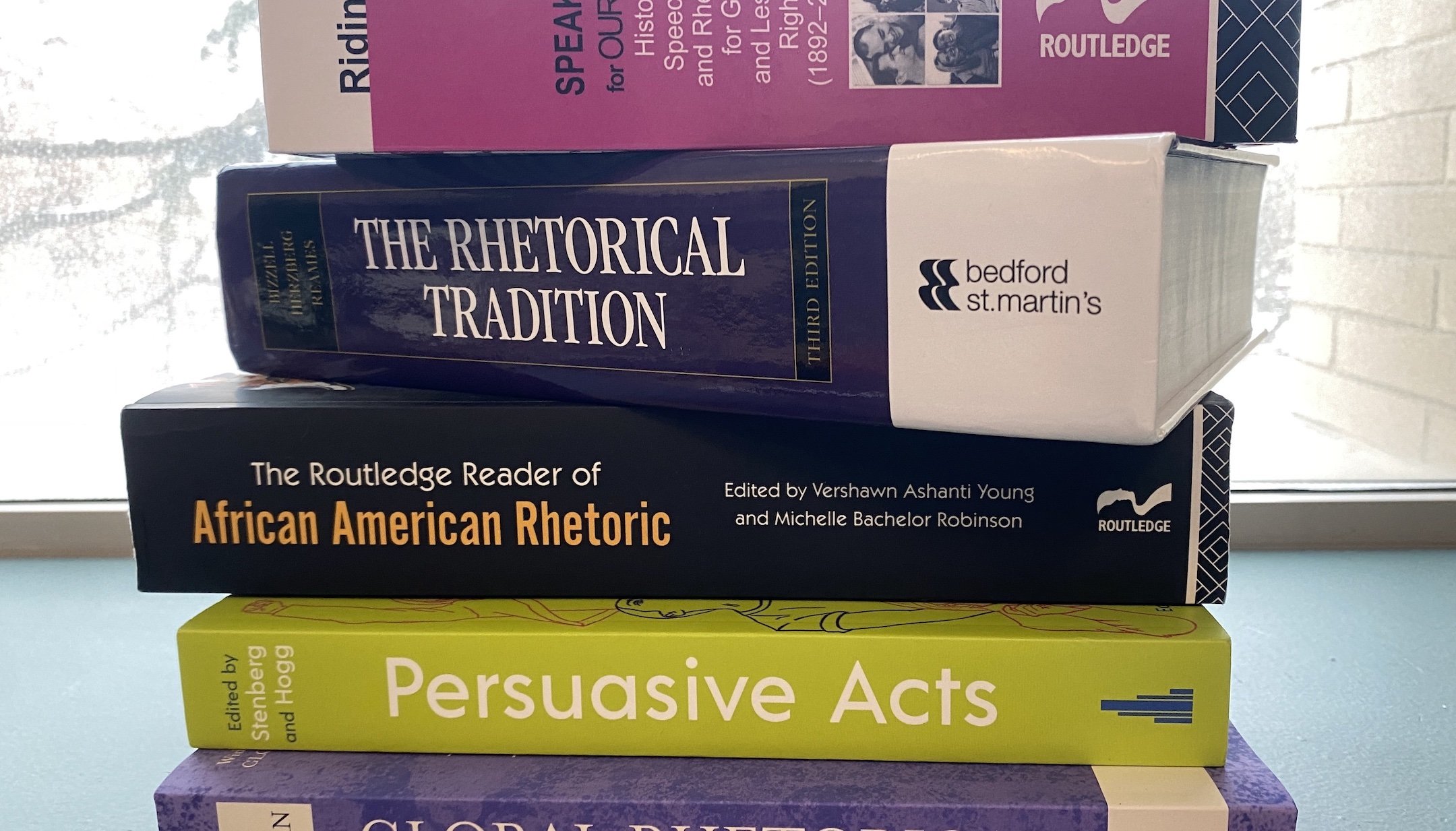“Academe,” 3D Mural by John Pugh, 1981
recent Course, ENGL 487W: Rhetoric and Deception from plato to the present (Spring 2024 Senior seminar)
This course explores the fascinating relationship between rhetoric and deception in the West beginning with the Presocratics and Plato and extending to misinformation campaigns and artificial intelligence. Units focused on ancient and contemporary practices of magic, philosophical accounts of truth and lies, deception in the visual arts (from tromp de l’oeil painting techniques to photoshop and AI-generated images), and deception in the verbal arts (from premodern theories of style to misinformation campaigns, to chat GPT).
In this writing-intensive course, students conducted informal experiments with so-called deceptive technologies and composed reports on them; they kept deception logs to use for structured class discussions; they wrote short papers that work with rhetorical concepts and examine deceptive artifacts and technologies.
Bleeder, 2007, Walter Oltmann, ink and paper
recent Course, ENGL 583: extrarational rhetorical theory (fall 2023)
For the past few decades, scholars in rhetoric have challenged theories of rhetoric that privilege rational processes. After all, even enthymemes, those compressed nuggets of argument, short circuit those processes by cutting to the heart of the matter. This seminar will examine what else besides rationality rhetoric requires, and the answers given by scholars of rhetoric—bodies, aesthetics, feeling, affect, and so on—will organize the course. How has extrarational rhetorical theory changed the disciplinary conversations in rhetoric as it is studied and taught in the contexts of communication and writing studies? And finally, how might extrarational features of rhetoric be studies, which is to say what extrarational methods and methodologies are starting to take hold?
Students will leave this seminar with a deeper (felt!) awareness of rhetoric’s extrarational dimensions, scholarly conversations about those dimensions, and what concepts and approaches need further development.
past course, ENGL 583: Making a field: Rhetoric’s anthologies
Anthologies are efforts to constitute a discipline. As such, they provide opportunities to simultaneously study a field’s accounts of itself and to consider how such accounts are made, and on what presumptions and cross-disciplinary borrowings they are built. The primary texts of this seminar will be anthologies—including The Routledge Reader of African American Rhetoric, Available Means: An Anthology of Women’s Rhetoric, The Rhetorical Tradition, Persuasive Acts: Women’s Rhetorics in the Twenty-first Century, Mestiza Rhetorics, and Global Rhetorical Traditions. We will supplement the anthologies with readings on disciplinarity, selection, anti-racist editing, and other activities and cross-media formats. We will compare anthologies with corollary genres—handbooks, edited volumes, companions, digital archives—and evaluate the group as tools for research and teaching. For the final project, students will plan new anthologies, make sample selections, and compose sample headnotes for those planned anthologies. The seminar will also host at least two anthology editors as guest speakers.
past course, ENGL 487W: Climate Rhetoric (Fall 2022 Senior Seminar)
In this senior seminar, students investigate rhetorical approaches to the climate crisis as practiced by youth activists, climate scientists, public artists, and policy makers. Students will leave this course with a stronger grasp of the specific challenges that the climate crisis poses to dominant conceptions of rhetoric (e.g., rhetoric as reasoned persuasion) and how contemporary rhetors (artists, writers, scientists, activists) are meeting those challenges. A final project asks students to create a rhetorical plan for already-existing approaches or solutions to the climate crisis. Students registered for the course may access its material here.
Images of mineral sources for various pigments
PAST COURSE (STUDY IN ATHENS), CAMS/CAS 499, THE COLORS OF GREECE, THEN AND NOW, SPRING 2022
In this course, students study the materials used for ancient color production (for example, paint pigment, textile and fabric dyes), technologies for pigment identification, and the importance of color terms in ancient poetry and rhetoric. Lessons on materials and language will be interspersed with in-depth reading about controversies surrounding color. For example, the question of whether the ancient Greeks actually registered certain colors has been a matter of some controversy since the classicist W.E. Gladstone suggested, somewhat preposterously, that the ancients may have been color blind. The question of color and illusion or distortion riled the likes of Plato, and the matter of polychrome sculpture, while mainly a settled question among experts, nevertheless sparked controversy in recent years. Students will study these controversies while also examining efforts to reconstruct the vivid colors used on architectural sculpture, polychrome statues, buildings, clothing, and textiles.
Past Course, ENGL 584: Crisis rhetoric (Spring 2021)
The roots of the word crisis—from the Greek, krisis: decision, judgment, issue—thrum with urgency. (Ancient medicine used it to designate a sudden change or turning point of a disease.) Crisis names a moment as much as it does a feeling. And the same might be said for crisis rhetoric, the means by which dire conditions arrive and constitute a moment and constrain or enable possible responses. How can tools of rhetoric help us understand, frame, and/or intervene in contemporary crises? A unit on tools and concepts important for crisis rhetoric (e.g., temporality, public feeling, magnitude [megethos]) is followed by a unit on disciplinary approaches ranging from presidential rhetoric to technical communication. Student project plans identify and elucidate a particular crisis (current or past). Students leave this seminar with a deeper awareness of how rhetorical tools, concepts, practices, and rhetoric’s allied disciplines can help us understand and respond to crises—and which tools, concepts, and practices need further development.
ADDITIONAL COURSES TAUGHT
CAMS/CAS 499, Sites and Sounds of Ancient Rhetoric (Study in Athens, Spring 2022)
ENGL 15S, We Were: Penn State’s Rhetorical Past (Fall 2019)
ENGL 584, Rhetoric’s Sensorium (2017)






